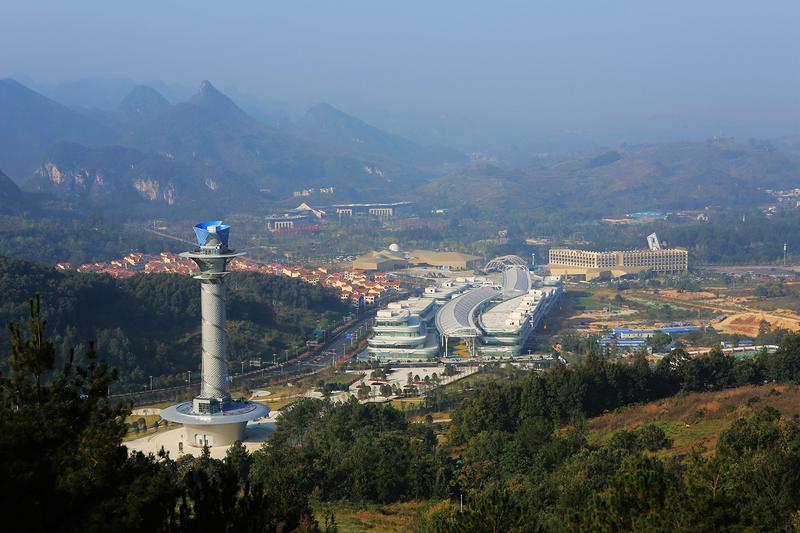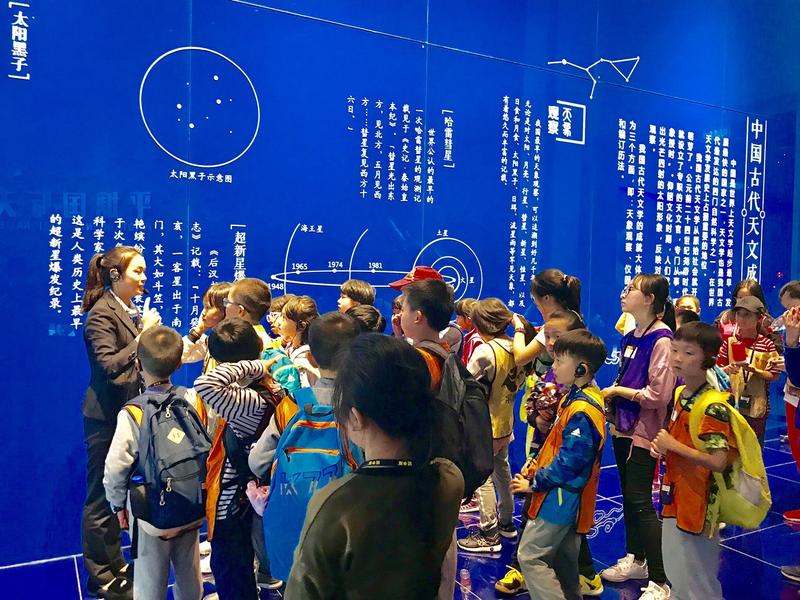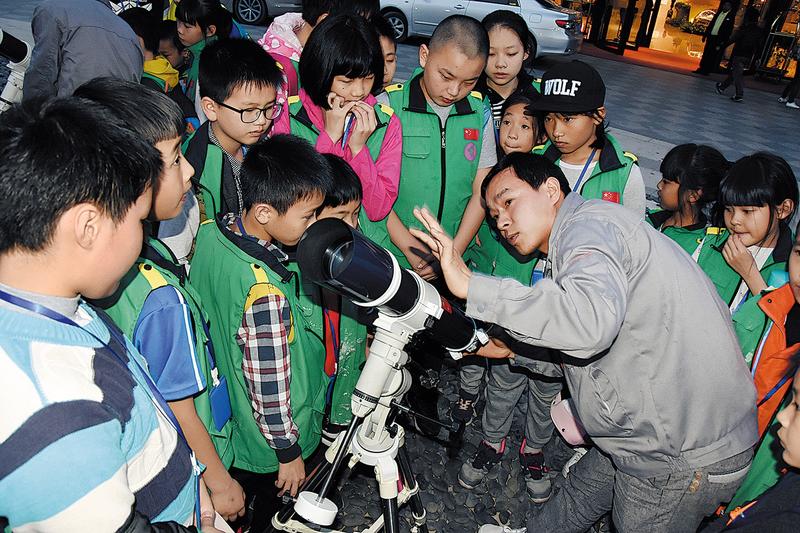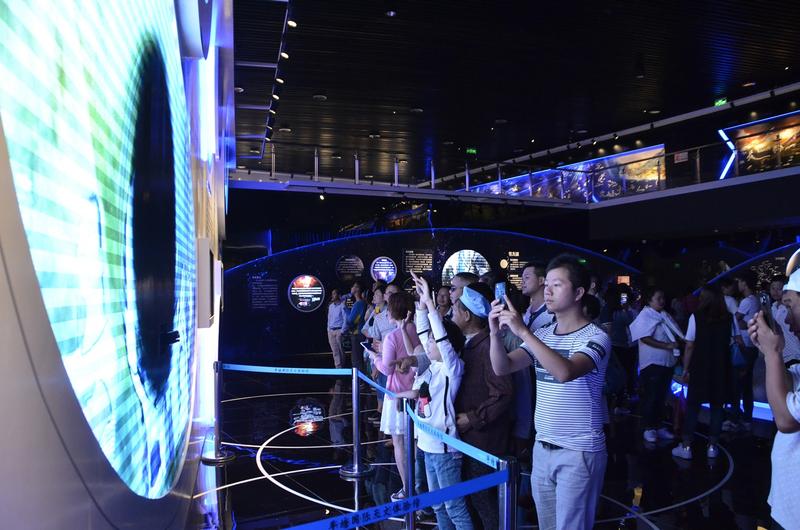Study tours mix astronomy lessons with sightseeing and exploring ethnic culture in Guizhou province, Xu Lin in Beijing and Yang Jun in Guiyang report.
 The renovated Kedu town attracts tourists due to its astronomy facilities, including a planetarium. (DAI CHUANFU / FOR CHINA DAILY)
The renovated Kedu town attracts tourists due to its astronomy facilities, including a planetarium. (DAI CHUANFU / FOR CHINA DAILY)
Scientists have identified more than 660 new pulsars via China's Five-hundred-meter Aperture Spherical Radio Telescope. The achievement was made via FAST, dubbed "China's sky eye", after it was officially declared fully operational in January 2020.
Located in a karst depression in Pingtang county, Qiannan Bouyei and Miao autonomous prefecture, Southwest China's Guizhou province, FAST is the world's largest single-dish radio telescope. While it has helped scientists with research, the telescope has also benefited the remote county's residents with tourism.
An astronomy-themed cultural park, which includes a planetarium, was built in Kedu, the closest town. Some 6,633 villagers from the mountainous areas surrounding the site of the telescope were relocated and many settled in Kedu.
"We want to build the town as a base for study tours on astronomy," says Wei Zhimin, Party secretary of Kedu. "Rural tourism is also our advantage, with farming and the local Bouyei ethnic culture."
 The renovated Kedu town attracts tourists due to its astronomy facilities, including a planetarium. (DAI CHUANFU / FOR CHINA DAILY)
The renovated Kedu town attracts tourists due to its astronomy facilities, including a planetarium. (DAI CHUANFU / FOR CHINA DAILY)
He says the town also wants to combine tourism with agriculture to promote the local animal husbandry and farm produce. Visitors can sample local pork and passion fruit, pick tea leaves and brew them later. With financial allocation, the town has focused on infrastructure and renovation projects, such as road repairs, that have increased convenience and tourism. According to him, locals used to make a living by farming or working in other places. The development of tourism has brought the town's residents more job opportunities, such as at restaurants and hotels. The prospects have also lured some locals to return, so they can be with their children and parents.
In 2018, local villager Wang Shunjun moved into a new house in Kedu built by the government, and opened a restaurant. He says the flow of tourists has boosted the local economy, because they eat and stay in the town. He recalls that in the past, a breakfast shop did average business there because the consumers were all locals.
"Now, many students of different ages come on study tours. Peak tourism happens during summer vacations, the National Day and Spring Festival holidays," he says. "Things have changed rapidly since the FAST project started, and we're very proud of it."
 Located in a karst depression, FAST, or "China's sky eye", has helped scientists make important scientific research achievements. (DAI CHUANFU / FOR CHINA DAILY)
Located in a karst depression, FAST, or "China's sky eye", has helped scientists make important scientific research achievements. (DAI CHUANFU / FOR CHINA DAILY)
Guizhou Pingtang Santian Tourism Development Co Ltd says it received 1,384 students in 10 study-tour teams in the first half of 2022.
At the Pingtang International Experience Planetarium, students can learn about the telescope and astronomy. The study tours include visits to scenic spots and exploring ethnic culture. The tours last from one to five days, and provide brochures and certificates to the students. The company works with major travel agencies to promote the tours over short video platforms, and organizes science popularization speeches at schools.
"It's important to design the courses to cater to students' diverse demands, including enhancing interactions. And it's essential to train the teacher or guide regularly and work with universities to help the tours," says Lu Dehua, deputy general manager of the company.
 China's Five-hundred-meter Aperture Spherical Radio Telescope is located in Pingtang county, Guizhou province, which has become a popular destination for astronomy study tours. (PHOTO PROVIDED TO CHINA DAILY)
China's Five-hundred-meter Aperture Spherical Radio Telescope is located in Pingtang county, Guizhou province, which has become a popular destination for astronomy study tours. (PHOTO PROVIDED TO CHINA DAILY)
In May 2017, Ren Chuan'gui, a Chinese teacher from Pingtang Ethnic Middle School, co-founded the school's astronomy association with a colleague, because of the FAST project.
"It is necessary to promote astronomy knowledge among our students. We feel the responsibility to do so," he says.
About 50 students were chosen among over 600 applicants that year. The number was limited because they only had basic equipment then. Now, the students can join two astronomy classes a week, both theory and practice, which are also open for non-association members. They learn about how to install and dismantle an astronomical telescope and join camping activities to observe stars in and around the area.
 P17 02.jpgChina's Five-hundred-meter Aperture Spherical Radio Telescope is located in Pingtang county, Guizhou province, which has become a popular destination for astronomy study tours. (PHOTO PROVIDED TO CHINA DAILY)
P17 02.jpgChina's Five-hundred-meter Aperture Spherical Radio Telescope is located in Pingtang county, Guizhou province, which has become a popular destination for astronomy study tours. (PHOTO PROVIDED TO CHINA DAILY)
After five years, the association has expanded its scale, winning support of the local government and residents. Ren's work has increased but he says more colleagues have joined the association that organizes science activities, including among primary school students. During Mid-Autumn Festival in September, the association places a telescope in the town square, where locals can observe the moon.
"Due to local government support our association members can visit other places for astronomy-related activities or take part in contests," he says. "It's a rare opportunity for students from such a small county to travel outside. They've become more confident, with a broadened horizon."
 China's Five-hundred-meter Aperture Spherical Radio Telescope is located in Pingtang county, Guizhou province, which has become a popular destination for astronomy study tours. (PHOTO PROVIDED TO CHINA DAILY)
China's Five-hundred-meter Aperture Spherical Radio Telescope is located in Pingtang county, Guizhou province, which has become a popular destination for astronomy study tours. (PHOTO PROVIDED TO CHINA DAILY)
He says some members of the association have achieved good results in gaokao, the national college entrance exam, and gotten to study majors in astronomy, aerospace and geology.
"Parents have also changed their thinking. They used to have a traditional view that studying in schools always came first, but now they've realized that students can also benefit from such extracurricular activities," he says.
Zhao Yandi contributed to this story.
Contact the writers at xulin@chinadaily.com.cn


